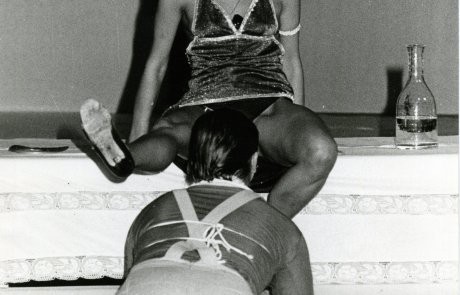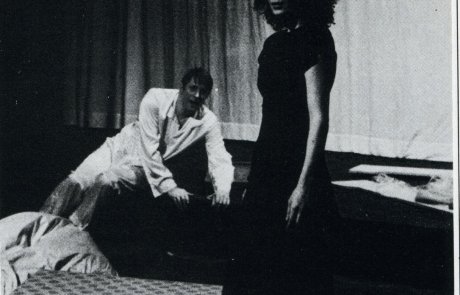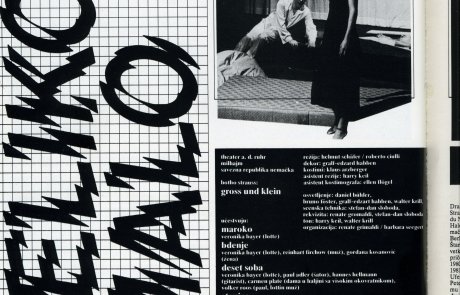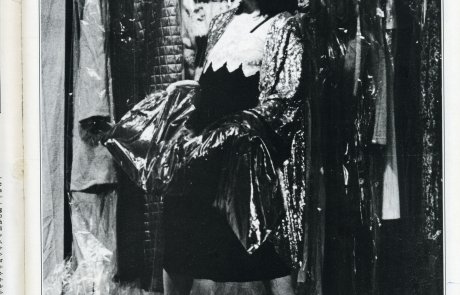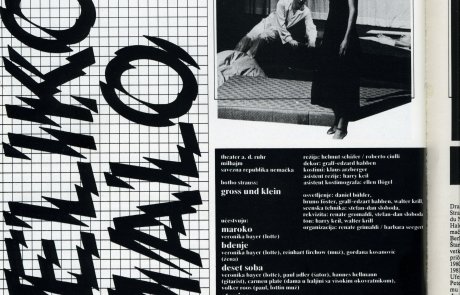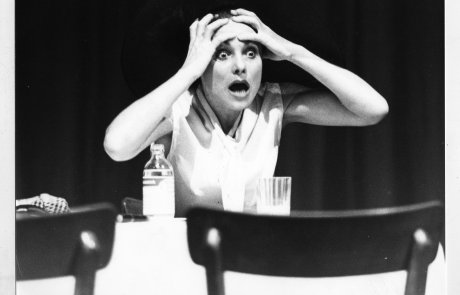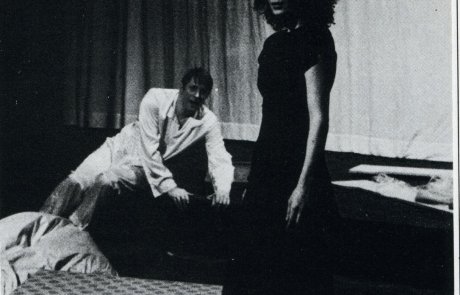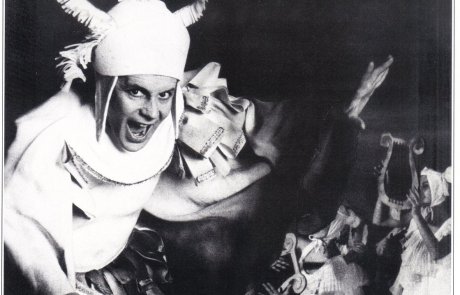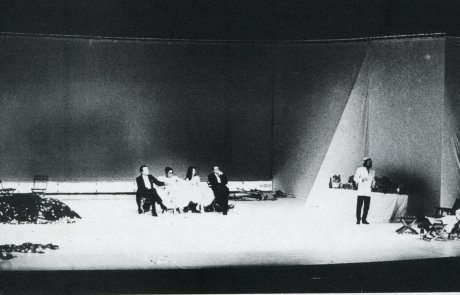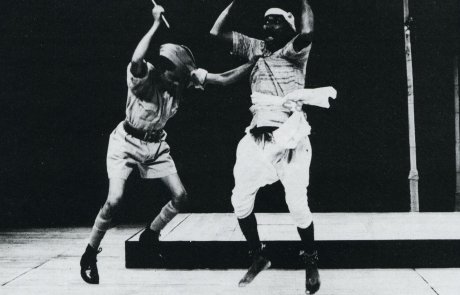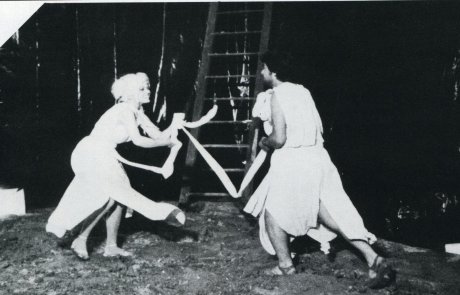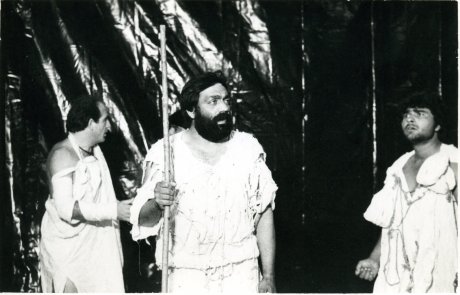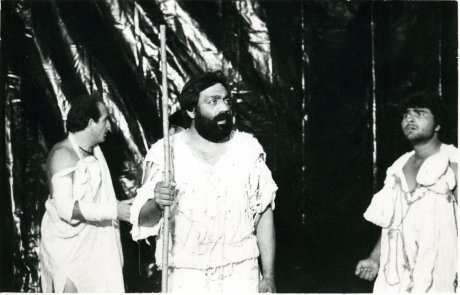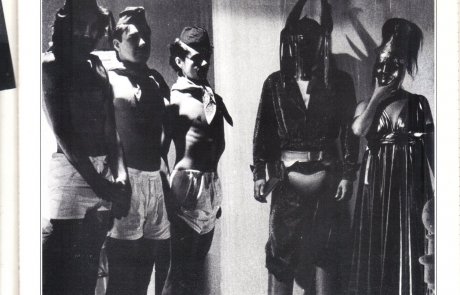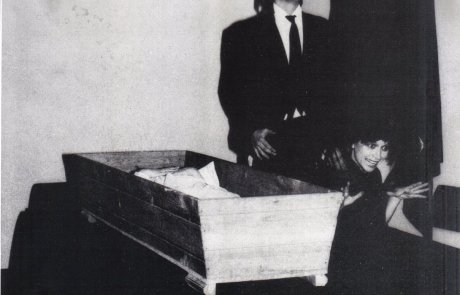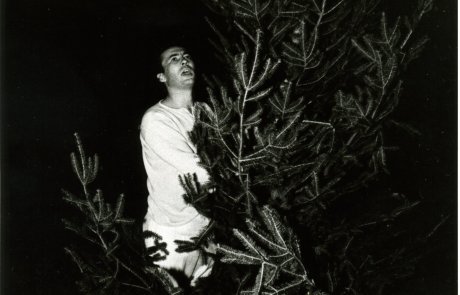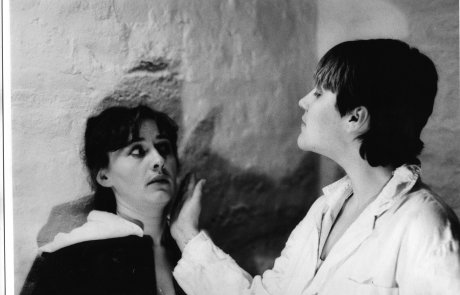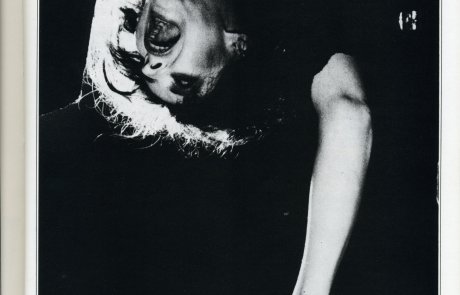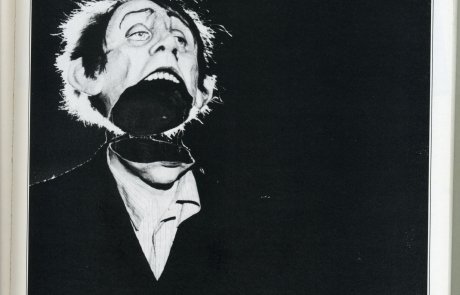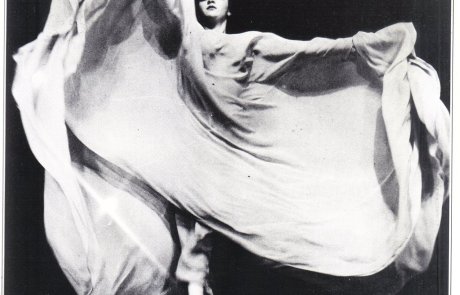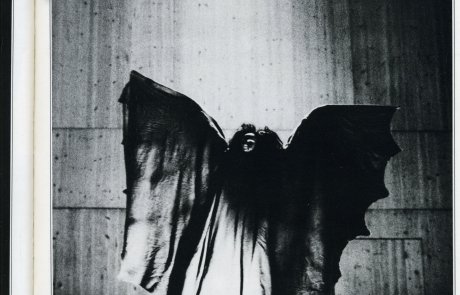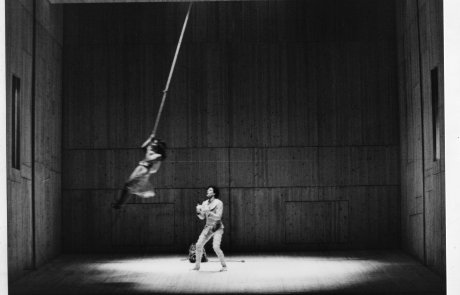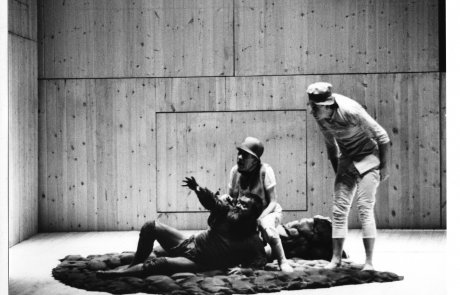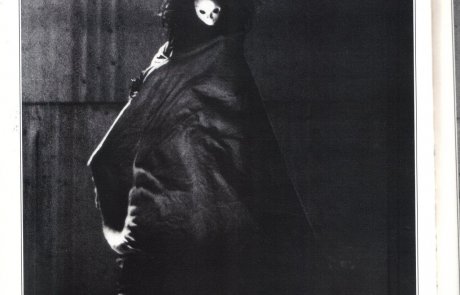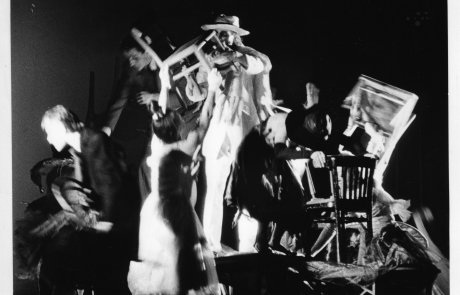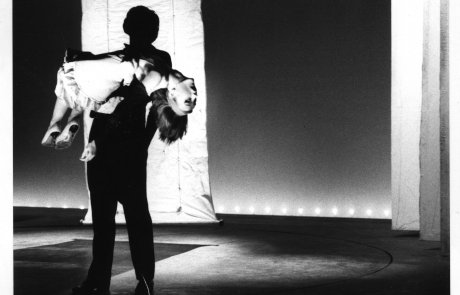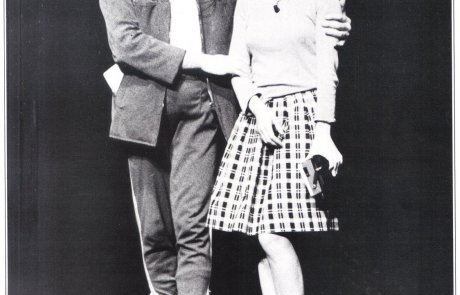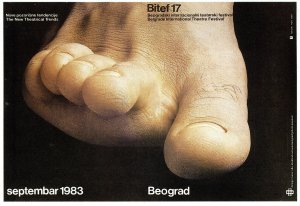
Dizajn / Design: Saveta Mašić / Slobodan Mašić (1939-2016)
HISTRIONIKA 83
Ne postoje sociološki dokazi o tome da ekonomsku i društvenu krizu prati pojačana pozorišna kriza. Naprotiv, godine društvenih previranja i materijalnih nedaća često su najplodnije godine svetskog pozorišta. Početak osamdesetih godina našeg veka nesumnjivo je period recesije u ekonomskom smislu. Kakvo je pozorište u ovoj deceniji pokazuje praksa tog pozorišta, tekuće sezone, a međunarodni festivali su neka vrsta svođenja računa tih sezona u svetskim razmerama.
Paradoksalna je činjenica da brige koje prate svakog pojedinca u teška vremena kao da mimoilaze pozorište. Što je sivlja svakodnevica, to je šarolikije pozorište. Pozorište kao da se u ta vremena vraća svojim izvornim snagama, svojim sokovima, svojim prednostima. A vraća se, pre svega, glumcu. Pozorište osamdesetih godina je ponovo u velikoj meri postalo histrionsko, uvereno u snagu glumačkog umeća, njegovu intuiciju, njegovu svestranost, njegovu večitost. Bilo je pozorišta i bez literarne reči, i bez reditelja, i bez pozorišnih sala, i bez pozorišne tehnike, pozorišta jedino nije bilo bez glumca i bez publike. Ako je postalo histrionsko, ne znači da je savremeno pozorište postalo obavezno zabavljačko, površno i lišeno potrage za ljudskim i društvenim suštinama. Ono je samo pošlo drugim putevima ili se vratilo nekim svojim drevnim stazama.
U svakom slučaju, i u doba kad pozorište želi da je najmudrije i kad je najmanje intelektualno, za njega važi ono što je napisao francuski sociolog teatra Jean Duvignaud: ,,Umetnost ne predstavlja odgovor na jedno pitanje, nego ona jasno izražava pitanje na koje se još ne može dati odgovor”.
Ni na jednom BITEFU od osnivanja nije kao na 17. BITEFU bilo tako malo klasičnih dela. U većini predstava, čak i kada je pisac potpisan, sami glumci su svojom igrom stvorili predstavu. Tekst je manje važan. Takve su predstave Double and Paradise Serapions Theatra iz Beča, takav je Bus iz Modene, po Ravmond Queneau-u, takav je Kraj Evrope iz Poznanja, Zatočenici slobode iz Ljubljane, Kraljičina luda iz Brna, sa izuzetnim glumcem Boleslavom Polivkom, Gevrey-Chambertin iz Pariza, pa čak i takve predstave kao što je Charan iz Nju Delhija i Zvezda i smrt iz Moskve, na tekst pesnika Pabla Nerude. Iz svih tih predstava bije mladost, neka nova energija, i lišene su predrasuda o žanrovima i ustaljenim oblicima pozorišta. Pre svega, na sve je uticala jedna nova rok-kultura, kultura nove mladosti. Takve su čak i predstave napravljene na klasične tekstove – San letnje noći iz jednog nekonvencionalnog pozorišta kakvo je pozorište iz Milhajma i Bura iz Barselone.
Pitanja koja hoće da postave ove predstave sigurno nisu ona ista pitanja koja je postavljalo svetsko pozorište pre više od jedne i po decenije kada je BITEF osnovan. Na nama je da ta pitanja prepoznamo.
Mira Trailovič i Jovan Ćirilov
HISTRIONICA 83
There is no sociological proof supporting the fact that economic and social crisis are accompanied by an underlined theatrical crisis. On the contrary, years of turmoil and material misfortunes often are the most fruitful years for the world theatre.
The beginning of the eighties of our century is undoubtedly a period of recession in the economic sense. What a theatre is within this decade is shown by the practice of the theatre, its current season, while international festivals are a sort of summing up of these seasons in world dimensions.
It is a paradoxal fact that worries that accompany every individual in difficult times appear to by-pass the theatre. The bleaker the everyday life, the more colourful the theatre. It would appear that in such times the theatre returns to its authentic forces, its juices, its advantages.
Above all it returns to its actor. The theatre of the eighties has again to a great degree become histrionic, sure of the strength of artistic skill, its intuition, its comprehensiveness, its eternity. There were theatres without the literary word, and without a director, and without a theatre hall, and without theatre props; the only thing theatre was never without was the actor and the public.
If it has become histrionic it does not mean that the contemporary theatre has necessarily become merely an entertainment, superficial and devoid of the search for human and social essentials. It has merely turned to other paths
or has returned to some of its ancient ones.
In any case, even at times when the theatre wishes to be the wisest, as well as when it is the least intelectual, what the French sociologist Jean Duvignaud wrote stands: Art does not represent an answer to a single question, indeed it clearly defines a question to which it is not yet possible to give an answer.
No BITEF from its establishment has featured so few classical plays as this 17th one does.
In most of the performances, even of plays which an author has signed, the actors themselves create the play through their acting. The text is less important. Such are first of all performances of Double and Paradise of the Serapions Theatre of Vienna, such is the Bus from Modena, after Raymond Queneau, such is the End of Europe from Poznan, The Prisoners of Freedom from Ljubljana, The Queen’s Fool from Brno, with the very exceptional Bolesav Polivka, Gevrey-Chambertin from Paris, and even such performances as Charandas Chor from New Delhi, and The Splendor and Death of Joaquin Murieta from Moscow, based on the text of the poet Pablo Neruda. Out of all these performances emanates youth, a new kind of energy; they are all divorced of prejudice in respect of genre and established forms of theatre. Above all they are all under the influence of the new rock culture, the culture of the new youth. Such are even performances based on classical texts Midsummer Night’s Dream presented by an unconventional theatre such as the theatre from Mülheim am Ruhr and The Tempest from Barcelona.
The questions these performances wish to pose are certainly not the same questions asked by the world theatre more than a decade-and-a-half-ago when BITEF was established. It is up to us to recognise these questions.
Mira Trailovic and Jovan Cirilov
Glavni program / Main programme
261 Divadlo Husa na provázku (Brno, Čehoslovačka); Boleslav Polivka: Kraljičina luda; režija: Boleslav Polivka / Divadlo Husa na provázku (Brno, Czechoslovakia); Boleslav Polivka: Šašek Královny (The Jester and the Queen); direction: Boleslav Polivka
262 Serapionstheater (Beč, Austrija); Ervin Piplits: Double & Paradise; režija: Ervin Piplits / Serapionstheater (Vienna, Austria); Erwin Piplits: Double & Paradise; direction: Erwin Piplits
263 La Compañia Núria Espert (Barselona, Španija); V. Šekspir: Bura; režija: Horhe Laveli / La Compañia Núria Espert (Barcelona, Spain); W. Shakespeare: La Tempestad (The Tempest); direction: Jorge Lavelli
264 Московский государственный театри мени Ленинского Комсомола – Ленкoм (Moskva, Savez Sovjetskih Socijalističkih Republika); Pablo Neruda: Zvezda i smrt Hoakina Muriete; režija: Mark Zaharov / Moscow State Theatre named after Lenin’s Komsomol (Moscow, The Union of Soviet Socialist Republics); Pablo Neruda: Звезда и смерть Хоакина Мурьеты (The Splendor and Death of Joaquin Murieta / Fulgor y muerte de Joaquín Murieta); direction: Марк Захаров (Mark Zaharov)
265 Naya Theatre (Nju Delhi, Indija); Habib Tanvir: Čaran; režija: Habib Tanvir / Naya Theatre (New Delhi, India); Habib Tanvir: Čaran (Charandas Chor); direction: Habib Tanvir
266 Teatr Nowy (Poznanj, Poljska); Januš Višnjevski: Kraj Evrope; režija: Januš Višnjevski (Grand Prix) / Teatr Nowy (Poznan, Poland); Janusz Wiśniewski: Koniec Europy (Noah’s Ark: The New End of Europe); direction: Janusz Wiśniewski (Grand Prix)
267 Akademsko Pozorište „Promena“ (Novi Sad, Jugoslavija); Aleksandar Vedenski: Jelka kod Ivanovih; režija: Haris Pašović / Change Treatre (Novi Sad, Yugoslavia); Алекса́ндр Ива́нович Введе́нский (Alexander Vvedensky): Jelka kod Ivanovih (Christmas Tree at the Ivanovs / Елка у Ивановых); direction: Haris Pašović
268 Slovensko Mladinsko Gledališče (Ljubljana, Jugoslavija); Emil Filipčič: Zatočenici slobode; režija: Janez Pipan / The Mladinsko Theatre (Ljubljana, Yugoslavia); Emil Filipčič: Ujetniki svobode (Prisoners of Freedom); direction: Janez Pipan
269 Roma-theatre „Pralipe“ (Skoplje, Jugoslavija); Kralj Edip – po Sofoklu; režija: Rahim Burhan / Roma-theatre „Pralipe“ (Skopje, Yugoslavia); Thagar Edip – katar o Soi’okles (Oedipus the King – based on Sophocles); direction: Рахим Бурхан (Rahim Burhan)
270 Théâtre du Chapeau Rouge (Pariz, Francuska); Ževre Šambreten; režija: Pjer Pradinas / Théâtre du Chapeau Rouge (Paris, France); Gevrey-Chambertin; direction: Pierre Pradinas
271 Theater an der Ruhr (Milhajm, Savezna Republika Nemačka); V. Šekspir: San letnje noći; režija: Roberto Ćuli (Specijalna nagrada) / Theater an der Ruhr (Mülheim, Federal Republic of Germany); W. Shakespeare: Der Sommernachtstraum (A Midsummer Night’s Dream); direction: Roberto Ciulli (Special Award)
272 Emilia – Romagna Teatro (Modena, Italija); Rejmon Keno: Bus – dva čina iz stilskih vežbi; režija: Paolo Poli / Emilia – Romagna Teatro (Modena, Italy); Raymond Quéneau: Bus – due tempi da Esercizi di stile (Bus, taken from Exercises in Style from Raymond Queneau); direction: Paolo Poli
273 Theater an der Ruhr (Milhajm, Savezna Republika Nemačka) Boto Štraus: Veliko i malo; režija: Helmut Šefer, Roberto Ćuli (Specijalna nagrada) / Theater an der Ruhr (Mülheim, Federal Republic of Germany); Botho Strauß (Botho Strauss): Groß und Klein (Big and Small); direction: Helmuth Schäfer, Roberto Ciulli (Special Award)
Your Content Goes Here
